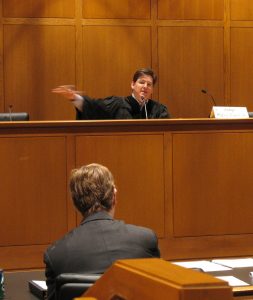The sad and ugly truth is that even pro se litigants who can apply the law to their cases must still overcome judicial bias. That’s not just me saying so. Now a federal judge is saying so. Judge Richard Posner has served on the 7th Circuit Court of Appeals since Ronald Reagan appointed him. A liberal in wolf’s clothing, he’s authored more than 3,000 opinions. He’s known for tough questioning and comic relief in oral arguments. Judge Posner retired this month, years earlier than planned.
His reason? The court’s refusal to address entrenched judicial bias against people representing themselves. As he told the Chicago Daily Law Bulletin, “I was not getting along with the other judges because I was (and am) very concerned about how the court treats pro se litigants, who I believe deserve a better shake.” In a New York Times interview on his sudden retirement, Judge Posner accused the court of funneling pro se appeals to staff lawyers, to be summarily dismissed over trivial technical issues. He said his colleagues refused to let him work with staff lawyers on their recommendations, which caused some tension on the court.
I gradually began to realize that this wasn’t right, what we were doing.
So he quit. While Chief Judge Diane Wood responded to Posner’s claims by affirming his right to an opinion, she said none of the other judges agreed that pro se litigants were treated unfairly. What else could she say, right? Would you believe there’s an entire section of the ABA dedicated to helping judges mitigate their implicit biases regarding gender, class and race? But judicial bias against self-represented litigants is the biggest threat to justice, and there’s nothing to help judges grapple with that.
The law in every jurisdiction requires judges to overlook minor technical issues in pro se pleadings and motions, and to help unrepresented parties focus their oral arguments. Unfortunately, trial judges don’t feel bound by these laws, and appellant courts won’t enforce them on appeal. What can we do about it? In my opinion, the best way to combat judicial bias is to surpass the judge’s expectations. File the right documents and make the right arguments in court. This is not impossible when the expectations are so low.
Follow these guidelines:
- Include in your filings only the information the court needs to understand your legal position. Don’t argue the case before trial.
- Support your case with solid legal research, and pepper your arguments with relevant citations to legal authority.
- File pleadings and motions that follow standard legal formatting. Don’t write letters to the judge.
Now this won’t cure your judge’s bias, but a pro se litigant who does these three things consistently has a decent chance at least of being heard. It’s our job at Courtroom5 to make it easier, but with the right effort, anyone can do this. Have you struggled with judicial bias in your case? What strategies did you use to get your case heard fairly? Share in the comments below.



